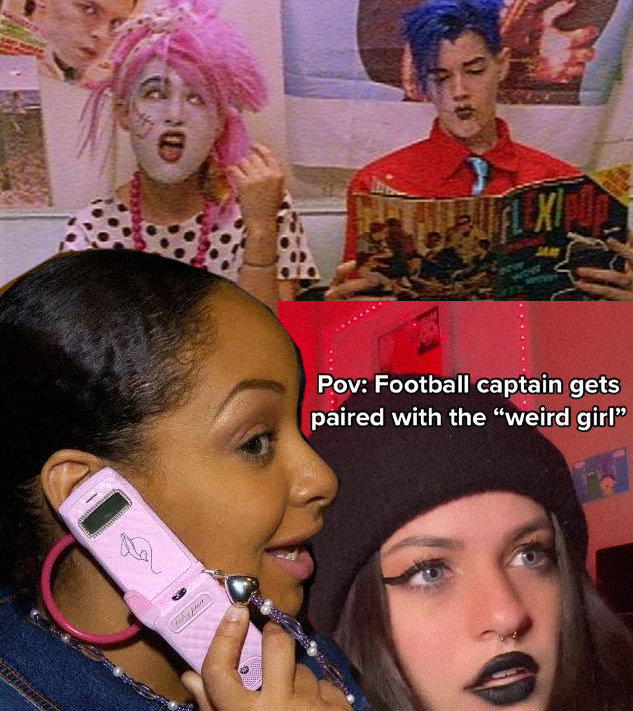The Chronically Online are Chronically Ambivalent: How Internet Language Distances Us from Sincerity
Words: Naomi Kline
Make it stand out
POV: We’re on a date and I forgot my wallet. The popular girl sits in front of you in class. The train lights start flickering. You finally try silver jewellery. You’re a brunette. Contemplating sewer slide. When you sit up too fast. When he finds out you’re an accountant. When you’re at the 260 Sample Sale.
In terms of its effect on language, TikTok might give Shakespeare a run for his money. Like all internet spaces, it houses fast-paced linguistic changes, intersecting visuals, audios, and captions to produce content at an unprecedented rate.
From the rise of censor-friendly vocabulary to endless new caption and audio trends, internet lingo keeps finding ways to combine new phrasing with existing context to keep its audience engaged. While these trends may seem light-hearted in practice, the uptick in facetious phrasing and incomplete thought signals an underlying culture of indifference. What holds meaning if not the words we speak? In a society growing increasingly detached, these doublespeak-like linguistics trends might be saying more than they seem.
Speech fillers, unnecessary discourse markers, and improper grammar are commonly used and not exclusive to the internet. The discourse around “like” as a filler has been around since the 1950s and has been used to criticise young people’s intelligence. Regardless of their informality, colloquial phrases like these convey uncertainty around a point that is eventually made, yet what sets new linguistic trends apart is their inherent lack of an explicit perspective. It’s not a lack of intelligence, but a lack of confidence.
___STEADY_PAYWALL___
“Regardless of their informality, colloquial phrases like these convey uncertainty around a point that is eventually made, yet what sets new linguistic trends apart is their inherent lack of an explicit perspective. It’s not a lack of intelligence, but a lack of confidence.”
Examples of the latter are rife on platforms like TikTok and Twitter, which encourage a constant spew of content. “POV”, “When you…”, “Me when…” act similarly to the subjunctive mood, inviting the audience into a hypothetical and often relatable situation. For example, a video captioned “POV: You run into your ex at a cafe” would be completed by a person in the video acting towards the camera as the ex, giving you, the viewer, a proper point of view for the skit. “When you [do or receive an action]” would be completed by the video reacting to the stated action. But these starters have become so obscured, they indicate nothing. Thousands of videos use the word “POV” to start an idea that isn’t finished within the video’s context. “POV: You just got a Stanley”. “When you wear a black dress”. These discourse markers are not fillers, but a crutch for a point that is forever incomplete. You got a Stanley, and you like it. You love this black dress. Or maybe you don’t. We’ll never know and can’t react because no one knows what you’re really thinking.
Online semantics have grown so ambivalent, it’s often impossible to determine one’s motives. On nearly every internet platform, ironic tones have become the default. We hate-watch bad movies, so they make more bad movies. People who take passionate stances for anything considered “cringe”. We’ve turned political leaders into memes for our enjoyment and mock political action while neither standing beside it nor against it. We turn important conversations into jokes so that we don’t have to confront them. Our place in the world doesn’t change because we refuse to acknowledge it - we aren’t holier for being contrarians.
Poor phrasing is a mild annoyance when dealing with innocuous material, but as this pattern grows, it indicates a chronic apathy at the root of our culture. To speak without conviction and to be intentionally vague is to relinquish one’s authority in not only their opinions, but their role in the world around them. By becoming detached from their own speech, one cannot blame the speaker for a voice they never took ownership of. In her 1961 essay, “On Self Respect”, Joan Didion distinguishes the mentality of the older generation with her own, stating, “They are willing to invest something of themselves; they may not play at all, but when they do play, they know the odds.” Today, we know our odds, and it frightens us. You can’t beat someone who never showed up to the game.
Much of this mentality can be broadly categorised within postmodernism, the prevailing school of thought that has been growing since the mid-20th century. One of the many facets of postmodernism is a distrust of authority which in turn has wrought art and literature with cynicism, nihilism, and irony. The latter once had purpose in a culture that was turning against the old guard, sticking it to the man by rejecting conventions of speech and formality. But now, endless irony keeps us under his thumb. Irreverent speech pulls us away from sincere thought, from making an earnest point or any point at all. This language could be defended by the fact that most social media content is unserious, facetious, casual. But that’s just the point; irony is the ultimate conversation ender, and by approaching a topic facetiously, there is no room for meaningful discussion.
From the pandemic to the economy to general social unrest, it’s clear why young people cower from decisive language and earnestness overall. In a world that at times seems like everything is out of your control, it is easier and more comfortable to be flippant rather than earnest. While once useful to criticise existing power structures, grammatical doublespeak and ironic language are now dismantling the conversations we have online. By hiding behind these manners of speaking, we are undermining our own opinions and making it easier for information to be misconstrued or unable to be properly discussed. Silly TikTok grammar mistakes are not the end of the world, but they do indicate a sickness within it.


